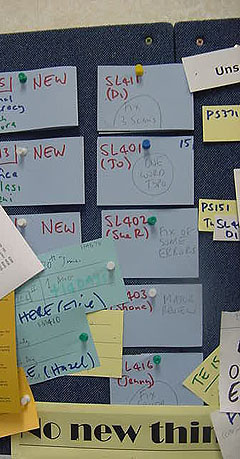Making the Transition/Schedule
| Making the Transition: from teaching to online facilitation | |
|---|---|
| A modest task: some minimum experience, understanding and knowledge to be online as a tutor, lecturer, teacher. | |
| Home | Schedule | Participant Notes | Agenda | Rationale |
| Resources | Participant Agreement |
Text to come | |
Following is a sample schedule for a workshop. We have encouraged people to print this off, and stick it to their wall, enter the dates into their PDA/Calendar or whatever. Anybody wanting to run this workshop will need to carefully consider the structure for their own particular situation. Our schedule is reasonably simple – columns for conversational themes, activities and sandbox challenges.
ODF formatted document for quick editing
Copy of a possible schedule
| TOPICS
One week on, one week off. Ten Weeks. |
Conversations
THEMES |
Application & practice
ACTIVITIES |
Playing with your online learning environment and the web.
SANDBOX |
| Weeks | |||
| 0. Onramp | Socialising of goals, expectations and timeline
Getting online |
Links
Find: cut and paste
| |
|---|---|---|---|
| 1. Learning theory
Facilitation Interaction patterns |
|
Find a link, find a quote on Online facilitation | Choose a caption
Just three words Images |
| ASIDE:
If there is a focus specifically on Web 2.0 |
Blog theme:
After you have done the activity, and read a few of the blogs, list some of the features of blogs. What makes a blog a blog? Blogs vs forums[2] |
What is web 2.0? For now, concentrate on blogs, wikis, tags (Delicious) and RSS (Bloglines)
Find a blog, read it, post the URL with a brief description. |
|
| 2. Design and structure of activities
Facilitator roles |
|
Optional: Write a comment on a blog
Field Trip I [choose from list] Set up a discussion. Responses in forums. Skype (VOIP) |
Web 2.0
Blogs and Wikis Personal Learning Envionments (PLE) a) Blogwatch http://bloglines.com b) Wikis
|
| 3. Processes
Being online |
|
Field Trip II: Choose from list.
Do something collaborative: Ning. Facilitate a discussion. |
Web 2.0
Tags, Folksonomy and http://del.icio.us
|
| 4. From course outline to implementation
Tips and Tricks |
|
Field Trip III: Choose from list
Interview an expert |
Web 2.0
Social software
|
| Analysis and Evaluation of experience
Assessment |
|
Party. | |
| Offramp |
References
- ↑ From Nancy’s Blog: http://www.fullcirc.com/weblog/2007/04/updationg-my-basic-article-on-online.htm This is a revamp of an article she first wrote in 1999.
- ↑ See Nancy’s article: http://kt.flexiblelearning.net.au/wp-content/uploads/2006/12/white.pdf Blogs and community: launching a new paradigm for online community? (Learnscope, September 2006)
